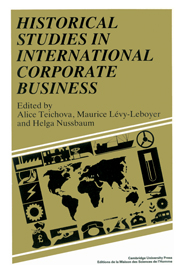Book contents
- Frontmatter
- Contents
- Preface
- 1 Introduction: multinational enterprise
- 2 History, the social sciences and economic ‘theory’, with special reference to multinational enterprise
- 3 The changing form of multinational enterprise expansion in the twentieth century
- 4 Electrical research, standardisation and the beginnings of the corporate economy
- 5 The nature of multinationals, 1870–1939
- 6 International price maintenance: control of commodity trade in the 1920s
- 7 Financial operations of US transnational corporations: development after the Second World War and recent tendencies
- 8 Multinational enterprise – financing, trade, diplomacy: the Swedish case
- 9 Foreign penetration of German enterprises after the First World War: the problem of Überfremdung
- 10 International industrial cartels, the state and politics: Great Britain between the wars
- 11 Vickers and Schneider: a comparison of new British and French multinational strategies 1916–26
- 12 J. & P. Coats Ltd in Poland
- 13 Multinationals and the French electrical industry, 1889–1940
- 14 The Japanese cotton spinners' direct investments into China before the Second World War
- 15 Mitsui Bussan during the 1920s
- 16 Japanese business in the United States before the Second World War: the case of Mitsui and Mitsubishi
- 17 The state and private enterprise in the United States–Latin American oil policy
- 18 Transnational corporations and the denationalization of the Latin American cigarette industry
- 19 Summary: Reflections on the papers and the debate on multinational enterprise: international finance, markets and governments in the twentieth century
- Index of names
- Index of firms
- Index of subjects
19 - Summary: Reflections on the papers and the debate on multinational enterprise: international finance, markets and governments in the twentieth century
Published online by Cambridge University Press: 04 August 2010
- Frontmatter
- Contents
- Preface
- 1 Introduction: multinational enterprise
- 2 History, the social sciences and economic ‘theory’, with special reference to multinational enterprise
- 3 The changing form of multinational enterprise expansion in the twentieth century
- 4 Electrical research, standardisation and the beginnings of the corporate economy
- 5 The nature of multinationals, 1870–1939
- 6 International price maintenance: control of commodity trade in the 1920s
- 7 Financial operations of US transnational corporations: development after the Second World War and recent tendencies
- 8 Multinational enterprise – financing, trade, diplomacy: the Swedish case
- 9 Foreign penetration of German enterprises after the First World War: the problem of Überfremdung
- 10 International industrial cartels, the state and politics: Great Britain between the wars
- 11 Vickers and Schneider: a comparison of new British and French multinational strategies 1916–26
- 12 J. & P. Coats Ltd in Poland
- 13 Multinationals and the French electrical industry, 1889–1940
- 14 The Japanese cotton spinners' direct investments into China before the Second World War
- 15 Mitsui Bussan during the 1920s
- 16 Japanese business in the United States before the Second World War: the case of Mitsui and Mitsubishi
- 17 The state and private enterprise in the United States–Latin American oil policy
- 18 Transnational corporations and the denationalization of the Latin American cigarette industry
- 19 Summary: Reflections on the papers and the debate on multinational enterprise: international finance, markets and governments in the twentieth century
- Index of names
- Index of firms
- Index of subjects
Summary
The papers already published in Teichova, Lévy-Leboyer and Nussbaum (eds.), Multinational enterprise in historical perspective (1986), and those now gathered in this volume, are too varied, wide-ranging and rich in fact and analysis to summarise. Perhaps I might, however, be allowed to comment on three issues that strike me as not without intellectual importance. I have in mind the role of technology in the multinational enterprise, the variety of forms of doing international business, and the fact that the choice among exporting, licensing technology, forming cartels, entering contracts, joint ventures, and forming a wholly-owned foreign subsidiary is often a very close one.
As Fieldhouse's useful summary reminds us (1986), we learn from Hymer that business operating away from its home base is always at a disadvantage, because of long lines of communication, operations in a culture which varies in degrees from that at home, at least slightly and perhaps very widely, and the agency problem that perhaps applies to all business and is usefully discussed by Nicholas (1986) – the difficulty at a distance of ensuring that the agent does what the principal has contracted with him to do, rather than operating in his own differing interest. To overcome these disadvantages, such a business must have a large advantage. Chandler (1986) finds this in large size, economies of scale, direct marketing rather than reliance on middlemen, and capital intensity, plus – a point bearing on technology – attention to research and development. But these advantages, it seems to me, start late rather than early in the course of foreign direct investment.
- Type
- Chapter
- Information
- Historical Studies in International Corporate Business , pp. 229 - 240Publisher: Cambridge University PressPrint publication year: 1989



